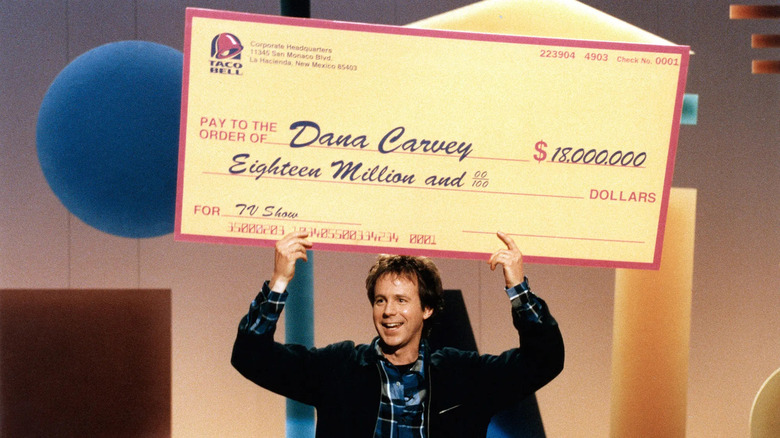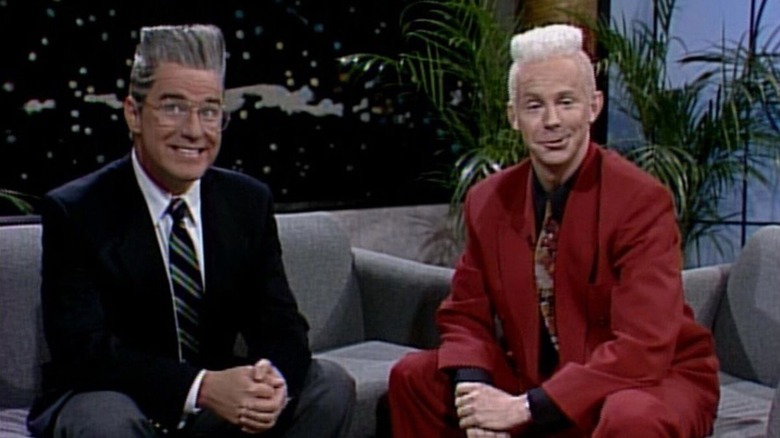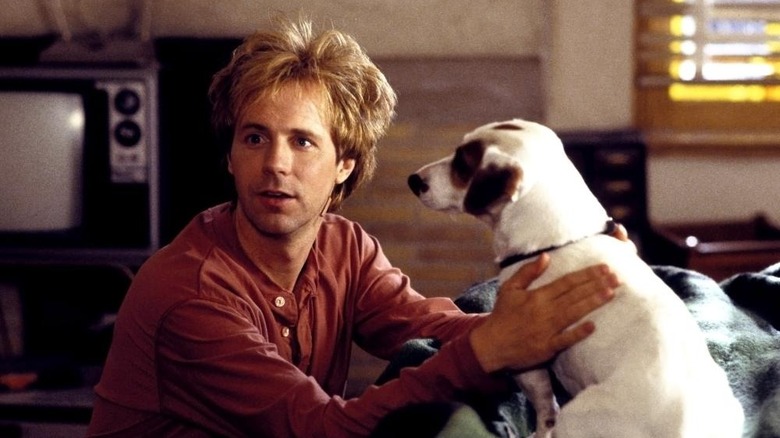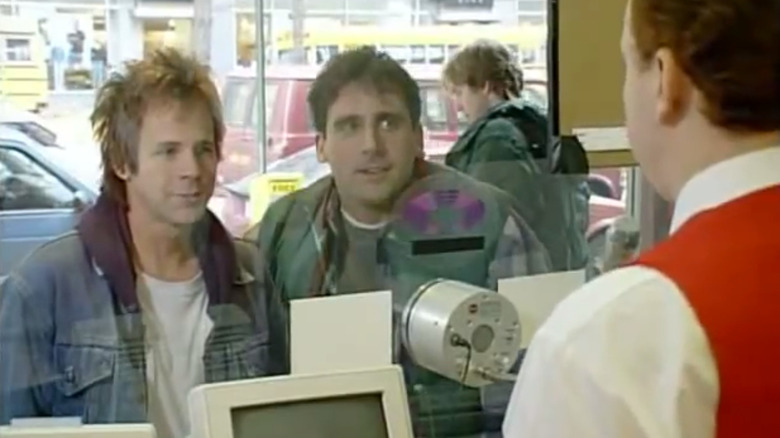The Dana Carvey Show Came Out Of Its Star's 'Horrible Movie Experiences'
Can you imagine a world without "The Dana Carvey Show?" To be fair, you probably can, as the ABC series only lasted for a meager eight episodes during the spring of 1996. While the show itself has gained a cult status over the decades, the real legacy of the series isn't about the show's impact on pop culture, but rather its bringing together of talent that would soon go on to impact pop culture.
Consider this staggering list of names involved: Robert Smigel, Stephen Colbert, Steve Carell, Spike Feresten (writer for David Letterman and "Seinfeld"), Robert Carlock (future showrunner of "30 Rock"), Dino Stamatopoulos (future writer of "Community" and Starburns himself) and Charlie Kaufman were all among the people helping Carvey bring his surreal sketch comedy show to the small screen.
Yet the series may not have happened at all had Carvey not been smarting after a short-lived career as a leading man on the big screen. Despite the quality of his work in these films, his on set experiences and the films' poor critical and commercial reputation led Carvey back to sketch, paving the way for the future careers that followed.
The Dana Carvey Show was almost a talk show
Before Carvey and his cohorts hit upon the idea of a boundary-pushing primetime sketch show, however, the star was briefly seduced by the opportunity to host his own talk show. The late night boom of the early '90s was heralded by the stepping down of longtime "The Tonight Show" host Johnny Carson, resulting in not only many comedians vying for a gig on that program, but joining forces with other networks as they sought to take talk show glory for themselves. That's how you get the disaster that was "The Chevy Chase Show," folks!
Carvey was a little more savvy than his fellow "Saturday Night Live" alum, though. Rather than pitching a new talk show, he found himself in the running to replace Carson's rival, David Letterman, back when that host was stepping away from NBC. As Robert Smigel recalled in an oral history of "The Dana Carvey Show" back in 2011:
"At one point Dana was talking about replacing Letterman. He had been offered that, and he wanted me and Conan [O'Brien, who eventually did take over for Letterman on NBC] to work for him on that show. He was red hot and had gotten a lot of offers after he left 'Saturday Night Live.' But he wasn't interested in the grind of a talk show, ultimately."
Carvey's 'horrible movie experiences'
Upon clarifying that "The Letterman thing was a couple years earlier," Carvey described how the real impetus for the show came after his starring in several motion pictures:
"After being in these horrible movie experiences with directors who hated me, basically because they resented that the studio forced me on them, I said, 'Oh, man. I really would love to do something with Smigel who I enjoyed so much.' I said, 'Maybe we'll do a variety show somewhere.' That's kind of how it started."
While Carvey doesn't go on to mention which of his directors hated him, it's entirely possible that he's referring to people he worked with in 1994. He was featured in supporting roles in two movies that year made by George Gallo (writer of "Midnight Run") and Alan Parker (director of "Fame"). Both of those films — "Trapped in Paradise" and "The Road to Wellville," respectively — garnered heavily mixed reviews.
Yet it's Carvey's third film of '94, "Clean Slate," that may be the likeliest culprit. Directed by Mick Jackson as his follow-up to the smash hit "The Bodyguard," the original star of the film was to have been Robert Redford, who is a decidedly different style of actor than the broader, goofier Carvey. While this writer believes "Clean Slate" and Carvey's performance in it is highly underrated, there's no denying that it was poorly received upon release, sending the "Wayne's World" star back to television.
A show slightly ahead of its time
Unfortunately for Carvey, television wouldn't turn out to be much of a refuge. "The Dana Carvey Show" was canceled nearly as soon as it had begun, and its bevy of future talent scattered to other projects. Just as his movie career had been prematurely stalled, Carvey's return to TV was more a result of bad timing than anything else. As fan of the show Jon Hamm said, just a few years after the show's cancelation, there existed a subculture of comedy programming like, "Cartoon Network and Comedy Central and FX and a million better venues for it to be viewed and appreciated."
Still, Carvey's career wasn't over (even if his leading man career, well, was), as the comedian went on to continue to perform live as well as guest star in a number of TV episodes and feature films. In terms of making the actual show, Carvey had no regrets. As he explained:
"When you put Steve Carell, Smigel, Colbert, Louis C.K., and Charlie Kaufman together and doing what we wanted — it does make sense that it was just in the wrong spot. But I'm still really proud of it."



